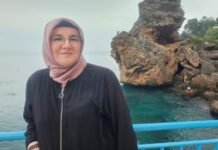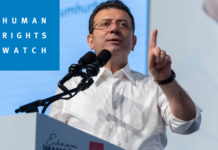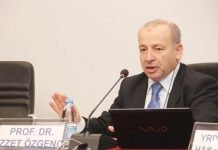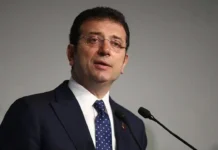The “Saturday Mothers” met in İstanbul’s Galatasaray Square for the 698th week to demand justice and the truth about the disappeared people in Turkey.
The mothers and those who joined the sit-in opened banners and displayed the photos of the disappeared in what has become a traditional sight on a Saturday at midday, no matter the weather.
According to a report by the pro-Kurdish Fırat news agency (ANF), this week the Saturday Mothers were asking justice for İbrahim Kartay, who disappeared after being taken into custody on August 15, 1994 in Diyarbakır province.
The first to speak was Hasan Karakoç, brother of Rıdvan Karakoç, whose body was found in 1995 after he was detained in 1994. Reminding that in Turkey, thousands of people have shared the same fate as Rıdvan Karakoç, Karakoç said, “This was something done by officers wearing your uniform.”
Karakoç directly addressed state authorities and added: “You are protecting your murderous executioners. We have been here for 23 years and we will be here for another 23 years. We will seek justice for as many as a hundred years, if necessary.”
After Karakoç, it was İkbal Eren who spoke about his brother Hayrettin, who disappeared on November 21, 1980. “We have been meeting in Galatasaray for 698 weeks, asking state institutions for the people who disappeared and were killed under custody.”
Eren asked the state why it does not “fulfill the task of carrying out effective and independent investigations that will finally tell what happened to our relatives who disappeared while in custody?”
Eren told the story of İbrahim Kartay, who was detained on August 15, 1994 during an operation carried out by soldiers in villages in the Hani district of Diyarbakır. “One of the villages surrounded by soldiers early that morning was Gömeç, some 19 kilometres from Hani. Hundreds of soldiers entered the village and ordered people to move out. They began to burn down the houses without giving villagers time to get their belongings,” she said.
According to Eren, the tragedy of Kartay (29) was as follows:
“Kartay had to leave the village with his family, his six-month-pregnant wife and three young children. He went into his house, which had not yet been burned, to get food. He took some cheese, tomato paste and bread, and went out to meet his family.
“He had traveled a short distance when he was detained by soldiers. His wife, Salime Çakır, waited for him at the village entrance, and was later informed by the villagers that İbrahim was taken into custody.
“Salime Çakır went with her children to a neighboring village and waited for her husband. Ten days passed with no news of Kartay. So his wife went to Hani to the prosecutor’s office with her father-in-law to get news of her husband. When the prosecutor’s office gave no answer, she went to the gendarmerie station.
“There, the gendarmes told Kadri Kartay: “Your son was a terrorist, but we have released him. We do not know where he went.” However, Kartay did not return home. His father went again to the gendarmerie station only to be fired at and threatened by gendarmes should he return.
“One of the villagers sent a message to the family saying that he had been kept in custody for eight days together with İbrahim and that İbrahim had told him he feared for his life.
“Twenty-one years passed, and finally someone told the family that İbrahim Kartay might by buried in a spot next to the graveyard in the center of Hani. With this information, his wife and son applied to the Hani Public Prosecutor’s Office through the Human Rights Association’s (İHD) Diyarbakır branch. The prosecutor’s office gave the family permission to excavate the place.
“On June 3, 2015, the remains of bones along with pieces of clothing were found. The bones were sent to the İstanbul Institute of Forensic Medicine for identification. However, the institute explained that the DNA in the bones did not match the DNA samples taken from the family.
“Kartay’s wife, Salime Çakır, has been looking for her husband for 24 years and said she would continue her search as long as she lives because she wants justice and the truth about her husband’s fate.”















